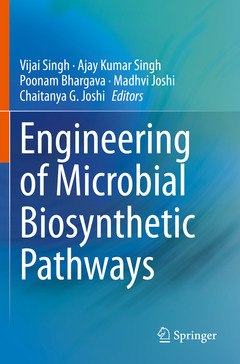Engineering of Microbial Biosynthetic Pathways, 1st ed. 2020
Coordonnateurs : Singh Vijai, Singh Ajay Kumar, Bhargava Poonam, Joshi Madhvi, Joshi Chaitanya G.

This book provides a comprehensive overview of the basic and advanced metabolic engineering technologies used to generate natural metabolites and industrially important biomolecules.
Metabolic engineering has the potential to produce large quantities of valuable biomolecules in a renewable and sustainable manner by extending or modifying biosynthetic pathways in a wide range of organisms. It has been successfully used to produce chemicals, drugs, enzymes, amino acids, antibiotics, biofuels, and industrially important pharmaceuticals.
The book comprehensively reviews the various metabolites detection, extraction and biosensors and the metabolic engineering of microbial strains for the production of industrially useful enzymes, proteins, organic acids, vitamins and antibiotics, therapeutics, chemicals, and biofuels. It also discusses various genetic engineering and synthetic biology tools for metabolic engineering. In closing, the book discusses ethical, patenting and regulatory issues in the metabolic engineering of microbes. This book is a valuable source not only for beginners in metabolic engineering, but also students, researchers, biotechnology and metabolic engineering based company.
Chapter 1. Fundamental Of Metabolic Engineering.- Chapter 1.1. Introduction to metabolic engineering.- Chapter 1.2. Mathematical modeling of metabolic pathways.- Chapter 1.3. Strain development and improvement.- Chapter 1.4. Microbial strain engineering.- Chapter 1.5. Techniques for detection and extraction of metabolites.- Chapter 1.6. Development of biosensor for detection of metabolites.- Chapter 2. Advanced tools for genetic engineering.- Chapter 2.1. Synthetic biology toolbox for metabolic engineering.- Chapter 2.2. CRISPR-Cas system for metabolic engineering.- Chapter 2.3. Recent advances in genetic engineering tools for metabolic engineering.- Chapter 2.3.1. Promoter engineering.- Chapter 2.3.2. Ribosome binding site engineering.- Chapter 2.3.3. Transcription factor engineering and riboregulator.- Chapter 2.3.4. Riboswitch, oscillator, biological gate, and amplifier.- Chapter 2.3.5. Cell free protein synthesis system, plasmid engineering, advanced cloning techniques, codon optimization, and recombination.- Chapter 2.3.6. Multiplex automated genome engineering, synthetic regulatory RNA, and microfluidics.- Chapter 2.4. Recent techniques for building of biosynthetic pathways.- Chapter 2.4. Ethical, patent and regulatory issues.- Chapter 3. Engineering of the natural products and biosythetic pathways.- Chapter 3.1. Amino acids.- Chapter 3.2.Vitamins.- Chapter 3.3. Organic acids.- Chapter 3.4. Polysaccharides.- Chapter 3.5. Industrial proteins and enzymes.- Chapter 3.6. Industrial proteins and enzymes.- Chapter 3.7. Therapeutics.- Chapter 3.8. Industrial chemicals.- Chapter 3.9. Biofuels.- Chapter 3.10. Flavours and fragrance.- Chapter 3.11. Isoprenoids pathway.- Chapter 3.12. Environmental pollutants.
Dr. Vijai Singh is an Associate Professor in the Department of Biosciences, School of Science at Indrashil University, Mehsana, Gujarat, India. He was an Assistant Professor in the Department of Biological Sciences and Biotechnology at Institute of Advanced Research, Gandhinagar India and also an Assistant Professor in the Department of Biotechnology at the Invertis University, Bareilly, India. Prior to this, he was a Postdoctoral Fellow in the Synthetic Biology Group at the Institute of Systems and Synthetic Biology, Paris, France and School of Energy & Chemical Engineering at the Ulsan National Institute of Science and Technology, Ulsan, South Korea. He has received his Ph.D. in Biotechnology (2009) from the National Bureau of Fish Genetic Resources, Uttar Pradesh Technical University, Lucknow, India with a research focus on the development of molecular and immunoassays for diagnostic of Aeromonas hydrophila. He has extensive experience in Synthetic Biology including MAGE, small regulatory RNAs, pathways design, CRISPR-Cas system, and Microfluidics. His research interests are focused on building of a novel biosynthetic pathway for production of medically and industrially important biomolecules. Additionally, his laboratory is working on CRISPR-Cas9 tools for genome editing. He has more than 8 years of research and teaching experience in Synthetic Biology, Microbiology, and Industrial Microbiology. He has published 74 articles, 25 chapters, and 4 books. Also, he serves as a member of editorial board and reviewer of a number of peer-reviewed journals.
Dr. Ajay Kumar Singh is currently working as an Assistant Professor in the Department of Food Process Engineering at Sam Higginbottom University of Agriculture, Technology and Sciences (SHUATS), Allahabad, India. He did his M Tech in Biotechnology in 2004 from the Institute of Engineering and Technology, Lucknow, India, and Ph.D. in Biotechnology from SHUATS, Allahabad, India. H
Reviews basic and advanced tools for the metabolic engineering of microbial strains to generate industrially important bioproducts
Presents recent advances in metabolic engineering, bioreactors, bioprocesses, strain development, pathway design, construction and optimization
Describes essential synthetic biology tools, including CRISPR-Cas systems for targeted genome editing in metabolic engineering
Addresses the mathematical modeling of metabolic pathways
Highlights the ethical and regulatory challenges posed by the metabolic engineering of microbial strains
Date de parution : 07-2021
Ouvrage de 318 p.
15.5x23.5 cm
Date de parution : 07-2020
Ouvrage de 318 p.
15.5x23.5 cm



